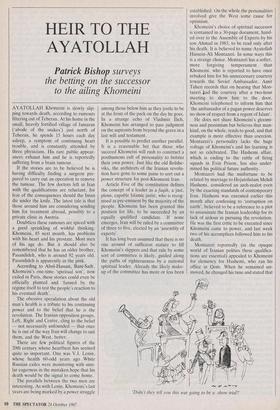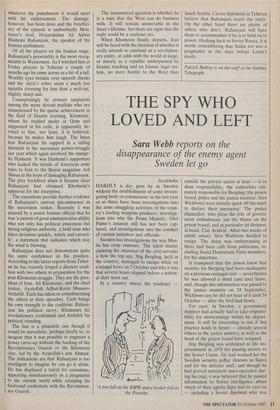HEIR TO THE AYATOLLAH
Patrick Bishop surveys
the betting on the successor to the ailing Khomeini
AYATOLLAH Khomeini is slowly slip- ping towards death, according to rumours filtering out of Teheran. At his home in the small, heavily fortified village of Jamaran ('abode of the snakes') just north of Teheran, he spends 15 hours each day asleep, a symptom of continuing heart trouble, and is constantly attended by three physicians. His rare public appear- ances exhaust him and he is reportedly suffering from a brain tumour.
If the stories are to be believed he is having difficulty finding a surgeon pre- pared to carry out an operation to remove the tumour. The few doctors left in Iran with the qualifications are reluctant, for fear of the consequences should the Iman die under the knife. The latest tale is that those around him are considering sending him for treatment abroad, possibly to a private clinic in Austria.
Doubtless these rumours are spiced with a good sprinkling of wishful thinking. Khomeini, 85 next month, has problems with his heart and his prostate. Most men of his age do. But it should also be remembered that he has an older brother, Pasandideh, who is around 92 years old. Pasandideh is apparently in the pink.
According to Abol-Hassan, Bani-Sadr, Khomeini's one-time 'spiritual son', now exiled in Paris, these stories could even be officially planted and 'fanned by the regime itself to test the people's reaction to his eventual death'.
The obessive speculation about the old man's health is a tribute to his continuing power and to the belief that he is the revolution. The Iranian opposition groups, Left, Right and Centre, cling to the belief — not necessarily unfounded — that once he is out of the way Iran will change to suit them, and the West, better.
There are few political figures of the 20th century whose heartbeat has seemed quite so important. One was V.I. Lenin, whose health 60-odd years ago White Russian exiles were monitoring with simi- lar eagerness in the mistaken hope that his death would be the signal to come home.
The parallels between the two men are interesting. As with Lenin, Khomeini's last years are being marked by a power struggle among those below him as they jostle to be at the front of the pack on the day he goes. In a strange echo of Vladimir Ilich, Khomeini has arranged to pass judgment on the aspirants from beyond the grave in a last will and testament.
It is possible to predict another parallel. It is a reasonable bet that those who succeed Khomeini will rush to construct a posthumous cult of personality to bolster their own power. Just like the old Bolshe- viks, the architects of the Iranian revolu- tion have gone to some pains to sort out a power structure for post-Khomeini Iran.
Article Five of the constitution defines the concept of a leader as a faqih, a just, pious, capable Islamic jurist, who is recog- nised as pre-eminent by the majority of the people. Khomeini has been granted this position for life, to be succeeded by an equally qualified candidate. If none emerges, Iran will be ruled by a committee of three to five, elected by an 'assembly of experts'.
It has long been assumed that there is no one around of sufficient stature to fill Khomeini's slippers and that rule by some sort of committee is likely, guided along the paths of righteousness by a national spiritual leader. Already the likely make- up of the committee has more or less been established. On the whole the personalities involved give the West some cause for optimism.
Khomeini's choice of spiritual successor is contained in a 30-page document, hand- ed over to the Assembly of Experts by his son Ahmad in 1983, to be read only after his death. It is believed to name Ayatollah Hussein-Ali Montazeri. In some ways this is a strange choice. Montazeri has a softer, more forgiving temperament than Khomeini, who is reported to have once rebuked him for his unneccessary courtesy towards the Soviet Ambassador. Amir Taheri records that on hearing that Mon- tazeri bad the courtesy after a two-hour meeting to show him to the door, Khomeini telephoned to inform him that 'the ambassador of a pagan power deserves no show of respect from a regent of Islam'.
He does not share Khomeini's gloomi- ness and pessimism but believes that man- kind, on the whole, tends to good, and that example is more effective than coercion. Montazeri's personality lacks the huge voltage of Khomeini's and his learning is not so celebrated. The Hashemi affair, which is ending to the rattle of firing squads in Evin Prison, has also under- mined his political future authority.
Montazeri had the misfortune to be related by marriage to Hojatolislam Mehdi Hashemi, considered an arch-zealot even by the exacting standards of contemporary Iran. Hashemi was executed earlier this month after confessing to 'corruption on earth', believed to be a reference to a plot to assassinate the Iranian leadership for its lack of ardour in pursuing the revolution. He was the first critic to be executed since Khomeini came to power, and last week two of his accomplices followed him to his death.
Montazeri reportedly (in the opaque world of Iranian politics these qualifica- tions are essential) appealed to Khomeini for clemency for Hashemi, who ran his office in Qom. When he remained un- moved, he changed his tune and stated that 'Didn't they. tell you this was going to be a show trial?'
whatever the punishment it would meet with his endorsement. The damage, however, has been done and the benefici- ary of the episode" is undoubtedly Mon- tazeri's rival, Hojatolislam Ali Akbar Hashemi Rafsanjani, the speaker of the Iranian parliament.
Of all the players on the Iranian stage, Rafsanjani's personality is the most recog- nisable to Westerners. As I watched him at Friday prayers in Teheran a couple of months ago he came across as a bit of a lad. Worldly eyes twinkle over smooth cheeks and the cleric's robes seem a much less suitable covering for him than a well-cut, slightly sharp suit.
Unsurprisingly he arouses suspicions among the more devout mullahs who are unimpressed by his sparse achievement in the field of Islamic learning. Khomeini, whom he studied under at Qom and supported in his exile, is apparently de- voted to him, not least, it is believed, because he makes him laugh. The Iman lent Rafsanjani his support in a telling skirmish in the succession power-struggle last year which again involved the energe- tic Hashemi. It was Hashemi's supporters who leaked the details of American arms sales to Iran to the Beirut magazine Ash Shiraa in the hope of damaging Rafsanjani. The ploy backfired when it became clear Rafsanjani had obtained Khomeini's approval for the enterprise.
The executions provide further evidence of Rafsanjani's current pre-eminence in the succession stakes. Recently I was assured by a senior Iranian official that he was 'a person of good administrative ability who not only has political awareness but strong religious authority, a bold man who takes decisions quickly, wisely and correct- ly', a statement that indicates which way the wind is blowing.
Rafsanjani does not demonstrate quite the same confidence in his position. According to the latest reports from Teher- an he has recently forged a discreet coali- tion with two others in preparation for the post-Khomeini struggle. They are the pres- ident of Iran, Ali Khamanei, and the chief justice, Ayatollah Adbul-Karin Mussavi- , Ardabili. Each has taken to complimenting the others in their speeches. Each brings his own strength to the coalition: Rafsan- jani his political savvy, Khamanei his revolutionary credentials and Ardabili his political standing.
The line is a plausable one though it would be unrealistic, perhaps fatally so, to imagine that it was possible to engineer a power carve-up without the backing of the Revolutionary Guards or the Khomeini clan, led by the Ayatollah's son Ahmad. The indications are that Rafsanjani is too :intelligent to imagine he can go it alone. He has displayed a talent for consensus, appearing simultaneously as a pragmatist to the outside world while retaining his firebrand credentials with the Revolution- ary Guards. The unanswered question is whether he is a man that the West can do business with. It will remain answerable in the Iman's lifetime, but there are signs that the reply could be a cautious yes.
When Khomeini finally departs, Iran will be faced with the decision of whether it really intends to continue as a revolution- ary entity, at odds with the world at large, or merely as a republic underpinned by Islamic teaching and an Islamic legal sys- tem, no more hostile to the West than Saudi Arabia. Clever diplomats in Teheran believe that Rafsanjani wants the latter. On the other hand there are plenty of others who don't. Rafsanjani will have them to accommodate if he is to hold on to power. Harking back to Soviet Russia, it is worth remembering that Stalin too was a pragmatist in the days before Lenin's death.
Patrick Bishop is on the staff of the Sunday Telegraph



















































 Previous page
Previous page